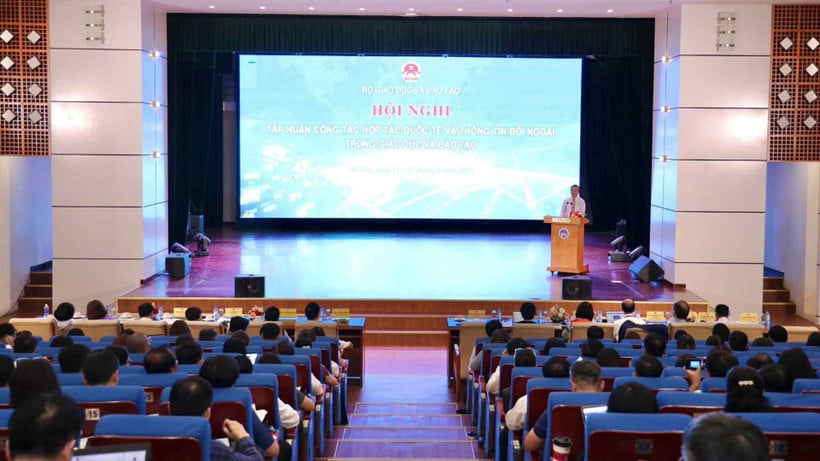
The conference aims to update and disseminate in a timely manner new guidelines and policies of the Party, the State and the Ministry of Education and Training in foreign affairs, management of international cooperation activities in the field of education and training; at the same time, create opportunities for units to share experiences, exchange and remove difficulties in the implementation process.
Speaking at the conference, Deputy Minister of Education and Training Nguyen Van Phuc said: In recent years, our Party and State have paid special attention to and strongly directed the work of international integration, in which education and training are identified as one of the key areas that need to be prioritized to promote cooperation, connection and comprehensive development. Most recently, Resolution 59-NQ/TW, an important decision of the Politburo on international integration in the new situation and Resolution 71-NQ/TW of the Politburo on breakthroughs in education and training development have been issued. In these Resolutions, international integration in education and training is affirmed to have important significance, contributing to improving the quality of education, attracting resources for the country, and promoting friendly cooperation between countries in the world.
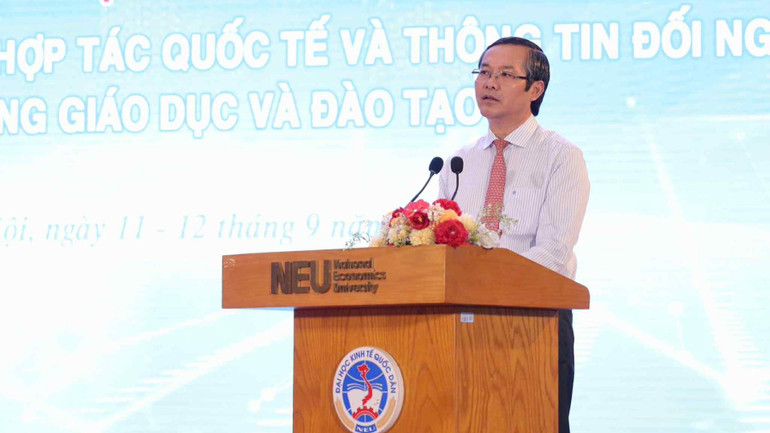
When discussing international cooperation in the field of education, Deputy Minister Nguyen Van Phuc emphasized that the most important thing to affirm is that the ultimate goal must be aimed at economic growth and the development of the country. This is the core meaning that all international cooperation activities in education need to aim at. International cooperation does not stop at small activities, but must become an important resource to promote development. Just as wind and storms can create energy, international integration in education is also an inevitable trend, bringing new strength to the development of Vietnamese higher education institutions.
Up to now, Vietnam has established educational cooperation relations with more than 100 countries and territories; participated in a number of sub-regional, regional and inter-regional mechanisms; contributed to raising the level of international cooperation in education and training. Many cooperation projects have been implemented to help improve the effectiveness of international cooperation and Vietnam's position in the international arena. Many Vietnamese universities have been present in the international training system, have good programs, contributing to the supply of human resources for businesses and economic sectors.
Up to now, Vietnam has established educational cooperation relations with more than 100 countries and territories; participated in a number of sub-regional, regional and inter-regional mechanisms; contributed to raising the level of international cooperation in education and training. Many cooperation projects have been implemented to help improve the effectiveness of international cooperation and Vietnam's position in the international arena. Many Vietnamese universities have been present in the international training system, have good programs, contributing to the supply of human resources for businesses and economic sectors.
Deputy Minister of Education and Training Nguyen Van Phuc
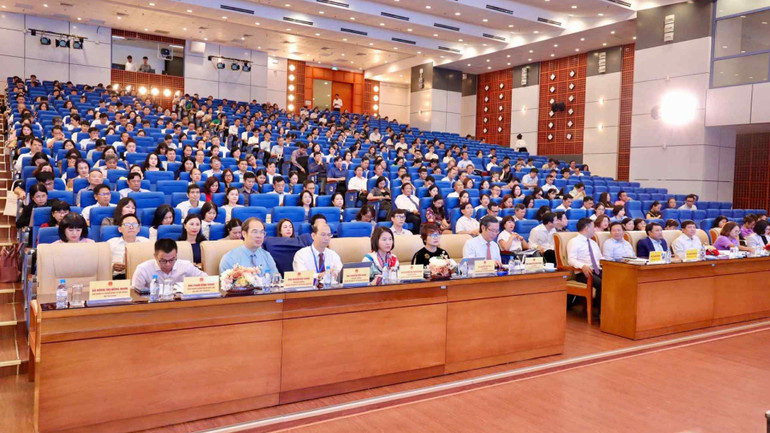
To effectively implement policies on international cooperation in education and training, schools need to be proactive and autonomous in international cooperation activities; at the same time, build a strong team of teachers and lecturers, because this is the key force to effectively implement international cooperation programs. In addition, schools need to have more quality joint programs, connecting students with businesses to contribute to training high-quality human resources.
The Deputy Minister also noted the management of centers: Foreign Languages, Information Technology, Life Skills, Study Abroad Consulting, etc., in which it is necessary to strengthen inspection, examination, and supervision of the activities of these centers to ensure quality and efficiency, contributing to improving the quality of education for students.
At the conference, Director of the Department of International Cooperation (Ministry of Education and Training), Nguyen Thu Thuy, said: Currently, there are 10 countries and territories that have signed the most agreements with Vietnamese higher education institutions, including: Australia, Taiwan (China), Germany, South Korea, the United States, Indonesia, Japan, France, Thailand and China.
Regarding joint training programs, as of June 30, 2025, there are 423 joint training programs at universities, 77 joint training programs at 32 colleges, and 67 training majors. Of which, Economics-Management accounts for 51%; Science, Technology, 19.8%; Social Sciences and Humanities 14.2%; Medicine and Pharmacy 5.7%; and the rest are other majors.
The 2021-2025 period also saw an increase in the quantity and quality of foreign lecturers, scientists and experts working at Vietnamese higher education institutions. Foreign lecturers come from many countries, the largest of which is South Korea (540 people), followed by the United States (537), France (450), Japan (405), Indonesia (140), Thailand (183), the United Kingdom (177), Australia (206), Taiwan (China) (127) and Russia (186).
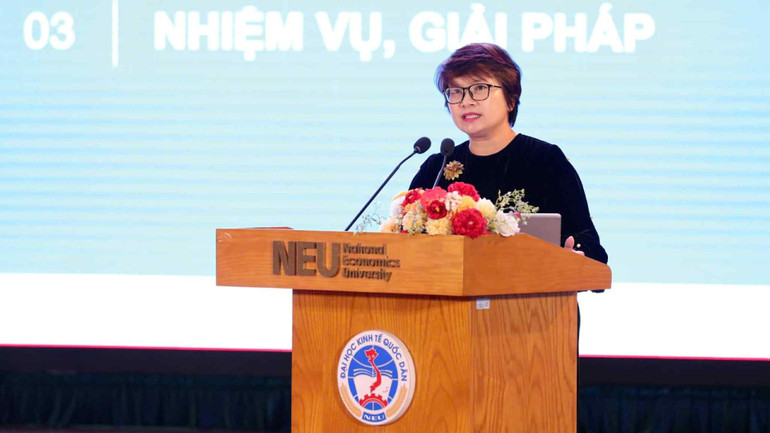
Director of International Cooperation Department (Ministry of Education and Training), Nguyen Thu Thuy presented a paper at the conference.
Some educational institutions attract a large number of foreign lecturers and experts such as: Ho Chi Minh City National University (1,162 people); Pham Ngoc Thach University of Medicine (767 people); Hanoi National University (491 people); Hue University (351 people); RMIT Vietnam (310 people); University of Commerce (118 people)...
Sharing the orientation for the coming time, Director of the Department of International Cooperation (Ministry of Education and Training), Nguyen Thu Thuy said: The Ministry of Education and Training will continue to perfect mechanisms and policies to effectively support higher education institutions to cooperate and link with prestigious universities and large enterprises abroad, especially in key areas and emerging technologies; encourage cooperation and training links according to digital education models, cross-border... At the same time, review and perfect mechanisms and policies to attract foreign students to study and research in Vietnam; build breakthrough mechanisms and policies to attract and use foreign experts, scientists and overseas Vietnamese to teach and research in Vietnam.
The education and training sector will continue to implement many activities to promote cooperation between Vietnamese and foreign educational institutions to recognize the learning process; strengthen coordination and sharing mechanisms to diversify student and lecturer exchange activities; expand integration in programs, learning materials, and teaching methods; at the same time, research and develop new school models, creating an international working environment.
At the conference, representatives of the Ministry of Education and Training and a number of related ministries and branches such as the Ministry of Home Affairs, the Ministry of Finance, and the Ministry of Public Security provided information on international cooperation activities in education and training; disseminated regulations and procedures for exemption from work permits, receiving experts and foreigners to study and work at educational institutions in Vietnam; as well as regulations on receiving non-governmental projects, ODA projects, etc. In addition, delegates focused on discussing and assessing the current situation, identifying advantages and difficulties and proposing solutions to promote international cooperation in education to develop more strongly and effectively in the coming time.
Source: https://nhandan.vn/ket-noi-toan-cau-de-phat-trien-giao-duc-ben-vung-post907477.html




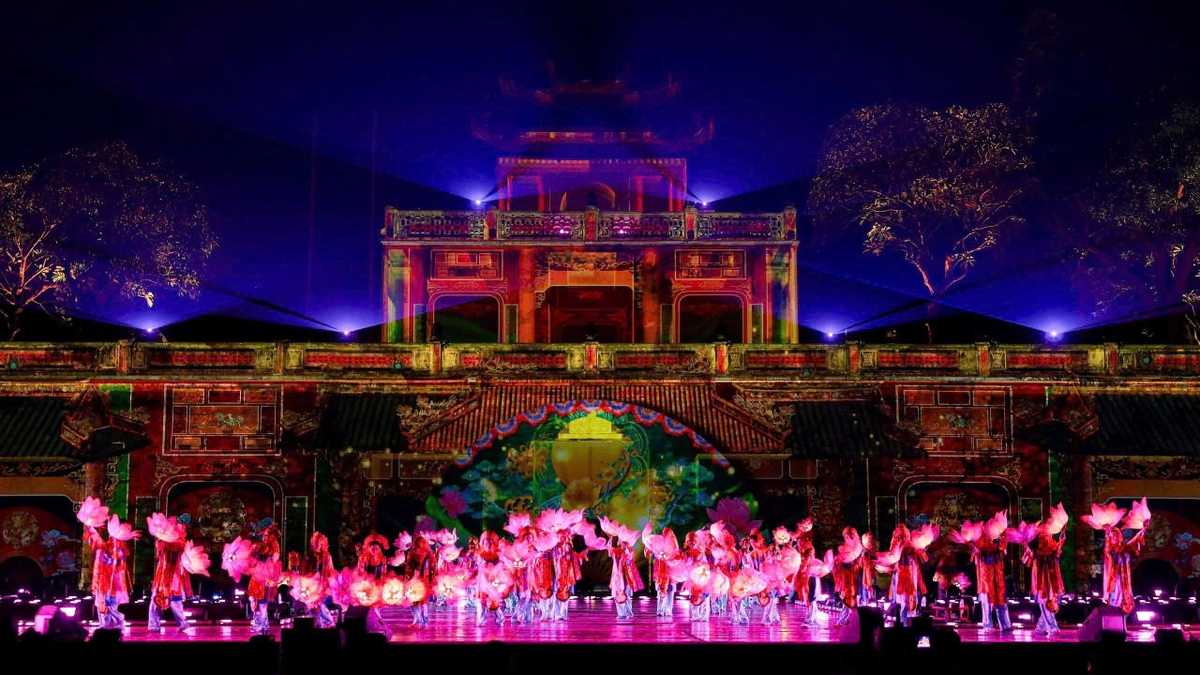

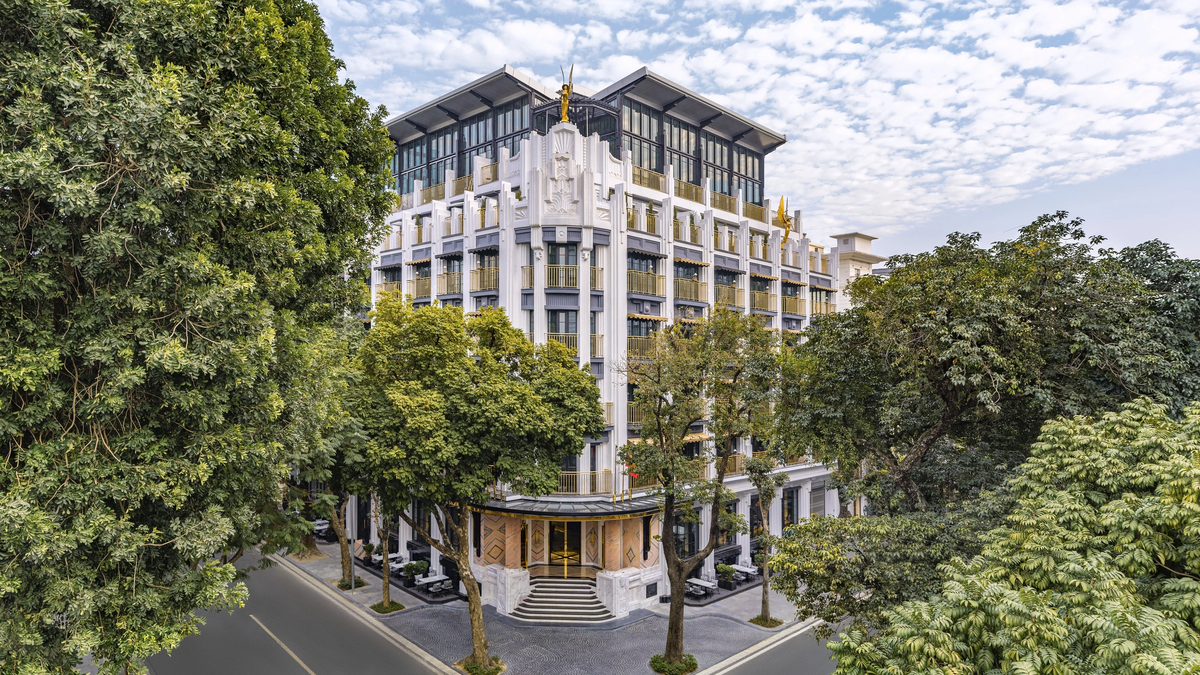















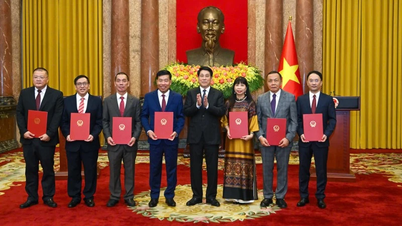



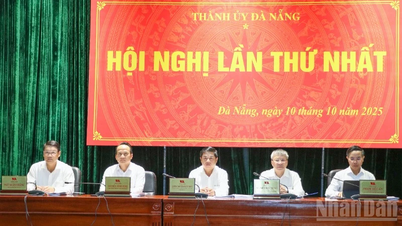























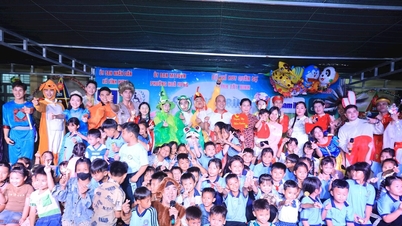




















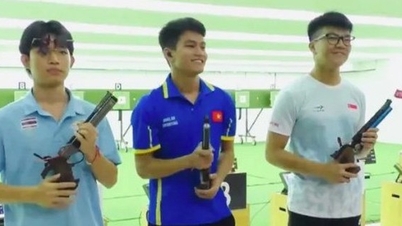



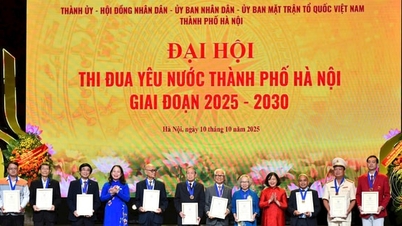





















Comment (0)